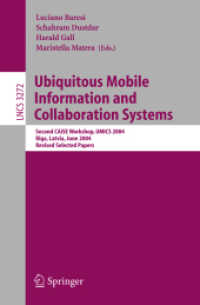- ホーム
- > 洋書
- > 英文書
- > Computer / General
Full Description
This two-set volume LNAI 16138-16139 constitutes the refereed proceedings of the 17th International Conference on Computational Collective Intelligence, ICCCI 2025, held in Ho Chi Minh City, Vietnam, during November 12-15, 2025.
The 67 revised full papers presented in these proceedings were carefully reviewed and selected from 290 submissions. The papers are organized in the following topical sections:
Part I: Collective Intelligence and Collective Decision-Making; Co-operative Strategies for Decision-Making & Optimisation; Natural Language Processing; Knowledge Engineering & Industry 4.0 Applications; Data Mining & Machine Learning.
Part II: Social Networks and Intelligent Systems; Cyber-Security, Blockchain & IoT; Computational Intelligence in Medical Applications; Computational Intelligence for Digital Content Understanding.
Contents
.-Social Networks & Intelligent Systems:From Relevance to Discovery: Trends in Overcoming Information Bubbles.-Enhanced Link Prediction in Social Networks Leveraging Reinforcement Learning and Similarity Algorithms.-Outdoor air quality and health impact: the PANORAMA knowledge graph based approach.-An Integrative Network Modeling Approach for the Interplay of Emotion Contagion, Empathic Responding, and Interpersonal Emotion Regulation for an AI Coach.-A Formal Model for Determining the Influence Between Users in Social Media Using Directed and Weighted Graphs.-Query-Aware Temporal Knowledge Graph Reasoning with Multi-Source Knowledge Based Generation.-Self-Attention based Sequential Recommendation Systems improved with Reviews Topic Modeling in e-Commerce Transactions.-Cyber-Security, Blockchain & IoT:Enhancing Phishing URL Detection with Graph Neural Networks: A Combination of URL and HTML Features.-Enhancing DevSecOps Through Large Language Model Integration: A Pipeline-Centric Approach.-Lightweight Activity Recognition Model Based on Tiny Machine Learning for Embedded Devices.-BeDFL: A Blockchain-enabled Decentralized Federated Learning in a Non-trusted Environment.-A Dual-Layer Defense Mechanism for Dropout Attack in Wireless Link Estimation.-Black-box Two-phase Adversarial Attack: Finding Important Regions and Reducing L2-loss.-Computational Intelligence in Medical Applications:Retinal Blood Vessels Segmentation for ROP Plus Form Diagnosis.-Data imputation for noisy time-series data in healthcare.-Leukemia Detection Based on YOLOv11 with Global and Local Contexts Interaction.-MOSL: Integrating multi-omics and machine learning to predict synthetic lethality in cancer cell lines.-The New Method for Detection of Alzheimer's Disease.-Enhanced CT Image Reconstruction Using VMD-Based Quaternion Bilateral Filtering.-Computational Intelligence for Digital Content Understanding: Automated Image Recognition Framework.-FaR: Enhancing Multi-Concept Text-to-Image Diffusion via Concept Fusion and Localized Refinement.-LTDAD-Talker: Landmark-guided Talking Face Generation with Temporal Consistency and Detail-Aware Discriminator.-Semi-Supervised Video Action Detection Using a UNet-like Architecture.-Enhancing Tracking-by-Transformer by using State Transition Prediction.-Temporal Interpolation of Variable-sized LIDAR Point Clouds.-WSS-CL: Weight Saliency Soft-Guided Contrastive Learning for Efficient Machine Unlearning Image Classification.-CLM: Momentum and Torque Conservation for Robust Continual Learning.-Learning action strategies in the Wumpus World with DQN.-Can Frequency Filtering Approximate CNNs for Enhancing Segment Anything?.-R&D: Balancing Reliability and Diversity in Synthetic Data Augmentation for Semantic Segmentation.-Deep Learning-Based Source Printer Identification from Microscopic Ink Dots Using Morphology-Based Augmentation.-An algorithm to remove motion-based artifacts in MRI data based on deep learning methods.-Imbalanced Data Problem in INTERCO Detection.-Collaborative Multimodal Learning for Human-Human Interaction Recognition in Videos.








